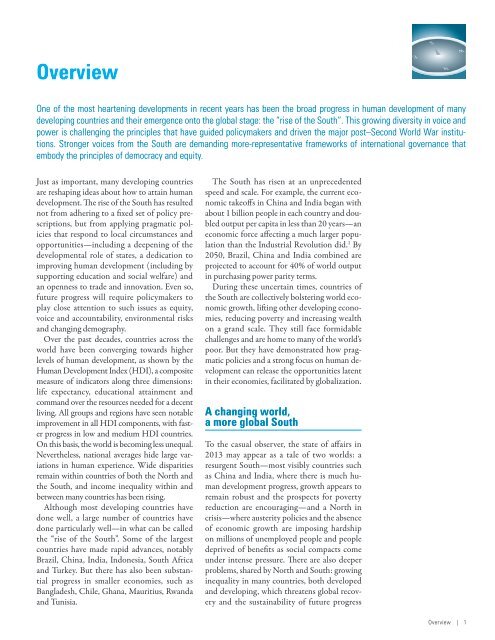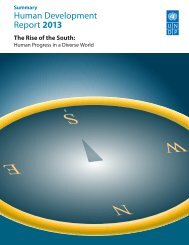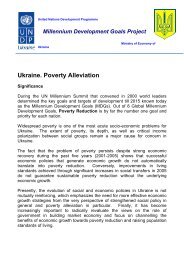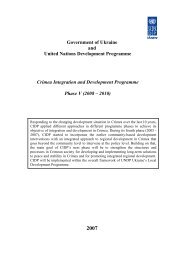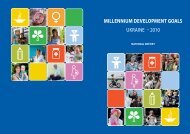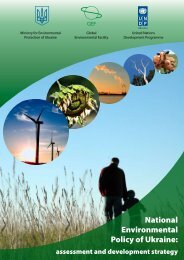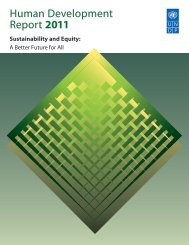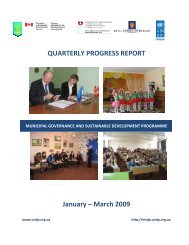E N S W - United Nations Development Programme
E N S W - United Nations Development Programme
E N S W - United Nations Development Programme
Create successful ePaper yourself
Turn your PDF publications into a flip-book with our unique Google optimized e-Paper software.
Overview<br />
One of the most heartening developments in recent years has been the broad progress in human development of many<br />
developing countries and their emergence onto the global stage: the “rise of the South”. This growing diversity in voice and<br />
power is challenging the principles that have guided policymakers and driven the major post–Second World War institutions.<br />
Stronger voices from the South are demanding more- representative frameworks of international governance that<br />
embody the principles of democracy and equity.<br />
Just as important, many developing countries<br />
are reshaping ideas about how to attain human<br />
development. The rise of the South has resulted<br />
not from adhering to a fixed set of policy prescriptions,<br />
but from applying pragmatic policies<br />
that respond to local circumstances and<br />
opportunities—including a deepening of the<br />
developmental role of states, a dedication to<br />
improving human development (including by<br />
supporting education and social welfare) and<br />
an openness to trade and innovation. Even so,<br />
future progress will require policymakers to<br />
play close attention to such issues as equity,<br />
voice and accountability, environmental risks<br />
and changing demography.<br />
Over the past decades, countries across the<br />
world have been converging towards higher<br />
levels of human development, as shown by the<br />
Human <strong>Development</strong> Index (HDI), a composite<br />
measure of indicators along three dimensions:<br />
life expectancy, educational attainment and<br />
command over the resources needed for a decent<br />
living. All groups and regions have seen notable<br />
improvement in all HDI components, with faster<br />
progress in low and medium HDI countries.<br />
On this basis, the world is becoming less unequal.<br />
Nevertheless, national averages hide large variations<br />
in human experience. Wide disparities<br />
remain within countries of both the North and<br />
the South, and income inequality within and<br />
between many countries has been rising.<br />
Although most developing countries have<br />
done well, a large number of countries have<br />
done particularly well—in what can be called<br />
the “rise of the South”. Some of the largest<br />
countries have made rapid advances, notably<br />
Brazil, China, India, Indonesia, South Africa<br />
and Turkey. But there has also been substantial<br />
progress in smaller economies, such as<br />
Bangladesh, Chile, Ghana, Mauritius, Rwanda<br />
and Tunisia.<br />
The South has risen at an unprecedented<br />
speed and scale. For example, the current economic<br />
takeoffs in China and India began with<br />
about 1 billion people in each country and doubled<br />
output per capita in less than 20 years—an<br />
economic force affecting a much larger population<br />
than the Industrial Revolution did. 1 By<br />
2050, Brazil, China and India combined are<br />
projected to account for 40% of world output<br />
in purchasing power parity terms.<br />
During these uncertain times, countries of<br />
the South are collectively bolstering world economic<br />
growth, lifting other developing economies,<br />
reducing poverty and increasing wealth<br />
on a grand scale. They still face formidable<br />
challenges and are home to many of the world’s<br />
poor. But they have demonstrated how pragmatic<br />
policies and a strong focus on human development<br />
can release the opportunities latent<br />
in their economies, facilitated by globalization.<br />
A changing world,<br />
a more global South<br />
To the casual observer, the state of affairs in<br />
2013 may appear as a tale of two worlds: a<br />
resurgent South—most visibly countries such<br />
as China and India, where there is much human<br />
development progress, growth appears to<br />
remain robust and the prospects for poverty<br />
reduction are encouraging—and a North in<br />
crisis—where austerity policies and the absence<br />
of economic growth are imposing hardship<br />
on millions of unemployed people and people<br />
deprived of benefits as social compacts come<br />
under intense pressure. There are also deeper<br />
problems, shared by North and South: growing<br />
inequality in many countries, both developed<br />
and developing, which threatens global recovery<br />
and the sustainability of future progress<br />
Overview | 1


